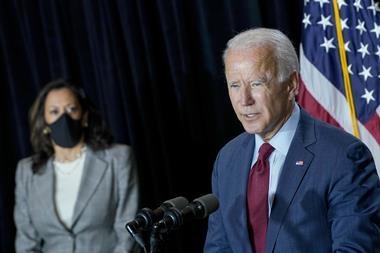US president Donald Trump’s press secretary recently asserted that ‘science should not stand in the way’ of US schools reopening amid the ongoing pandemic. Of course politicians won’t always follow the advice of scientists, but coming at the end of Trump’s presidential term, this statement seems to capture the ethos of an administration that has become increasingly distant from science.
I interviewed dozens of researchers and science advocates for my article on the upcoming presidential election, and heard the same message about Trump’s presidency from people on both sides of US politics. They all cited examples, too many to cover, of attempts by the administration to discredit facts that run counter to its agenda, and of policy decisions that, intentionally or not, have damaged the US research enterprise.
I interviewed dozens of researchers and science advocates for my article on the upcoming presidential election (p10), and heard the same message about Trump’s presidency from people on both sides of US politics. They all cited examples, too many to cover, of attempts by the administration to discredit facts that run counter to its agenda, and of policy decisions that, intentionally or not, have damaged the US research enterprise.
My interviews painted a clear picture, and it wasn’t pretty. But it’s tricky to be a journalist these days – an article that presents a negative portrait often faces accusations of bias or ‘fake news’, no matter how objective a reporter has tried to be. Reporting can be interpreted as an attack rather than capturing facts and current thinking. So I kept looking for scientists who would speak in Trump’s favour. I reached out to people from industry, including some from Trump’s inner circle, to ensure my article was balanced.
One such contact, once nominated by Trump to a very senior position at the US Environmental Protection Agency, expressed surprise that none of the scientists I spoke to had anything positive to say about Trump. They sent me six names that were ‘likely to see the good science Trump is trying to promote’. I was able to make contact with three.
These scientists said Trump’s words can’t be taken too seriously. They also contended that science has for too long been plagued by ‘group think,’ which they said the administration has tried to remedy by reorganising and rebalancing science advisory committees to be less dominated by academics and climate scientists. That was the extent of their defence for Trump, and they too shared many of the concerns of those I’d already interviewed.
Overall, the relationship between the president and the scientific community appears irreparably fractured, and that’s bad news for science if Trump is re-elected. There is even concern about potential retribution against scientists who openly oppose Trump, such as those who have signed a letter circulating among US Nobel laureates to endorse Trump’s opponent, Joe Biden.
In fact, many preeminent scientists in the US told me they are seriously considering leaving the country if Trump is re-elected. Attractive alternatives that they mention include Canada, Australia and New Zealand. They do not feel they belong in Trump’s America.

















No comments yet